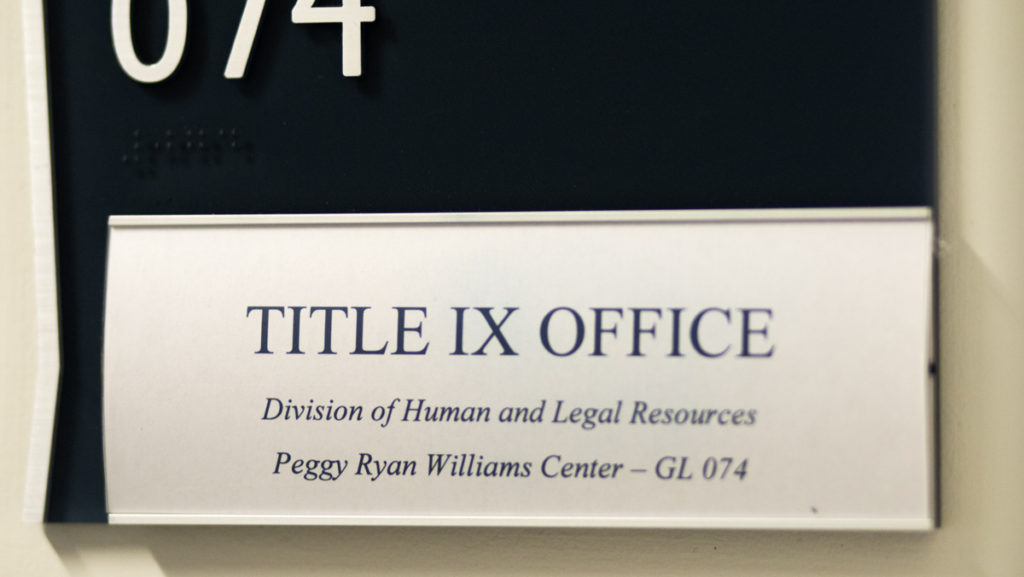Ithaca College students are advocating for the college to make changes to Title IX policies at the institutional level following the restrictive changes made by the United States Department of Education.
Title IX is a national law that prohibits discrimination on the basis of sex in educational institutions. Any college that receives federal funding must comply with Title IX regulations. Over time, Title IX has expanded to include regulations on how educational institutions should handle sexual misconduct.
Betsy DeVos, U.S. secretary of education, first began to make changes to Title IX in 2017 when she rescinded guidance put forth by President Barack Obama’s administration on how schools should handle sexual harassment. Previously, sexual harassment was defined as “unwelcome conduct of sexual nature. It includes unwelcome advances, requests for sexual favors and other verbal, nonverbal or physical conduct of a sexual nature,” according to the 2011 “Dear Colleague” letter. The new regulations have narrowed the definition of sexual harassment. It is now defined as “any unwelcome conduct that a reasonable person would find so severe, pervasive and objectively offensive that it denies a person equal educational access.”
The new regulations were released May 6 and took effect Aug. 14.
Senior Jennifer Larios started a petition to the college administration regarding the Title IX changes. As of Sept. 10, the petition had 797 signatures. IC Strike, a student organization that focuses on activism for survivors of sexual assault, wrote a letter to President Shirley M. Collado; La Jerne Cornish, provost and senior vice president for academic affairs; and Title IX Coordinator Linda Koenig.
The letter stated that the new national regulations “will have devastating consequences for students and their families.” Koenig said she was glad to see the letter and petition because it allowed the Title IX office to hear what students were saying and work with them.
Larios said she worked with IC Strike on the letter, which had eight demands for the college. The demands include establishing the preponderance of evidence in all campus sexual misconduct, harassment and discrimination cases; maintaining a time limit of 60 calendar days for the completion of sexual misconduct, harassment and discrimination cases with exceptions only for substantial extenuating circumstances; barring the use of informal resolution mechanisms in mediation in cases of sexual assault, rape, date and domestic violence and stalking; continuing to respond promptly to reports of and carry out existing investigations into sexual misconduct during the pandemic; guaranteeing all students access to reasonable interim measures regardless of where or when the violence or discrimination they experienced took place; creating and following sexual misconduct procedures for investigating otherwise not-covered instances of off campus and study abroad violence; changing the degrees of sexual abuse to match that of New York state’s; and following the Department of Education’s rescinded 2016 guidance on protecting LGBTQ+ students.
The college’s Title IX office sent a message to the campus community Aug. 17 detailing how the changes are being incorporated into the existing Code of Conduct. IC Strike said the college addressed six of its eight demands. The two unaddressed demands were maintaining a time limit of 60 calendar days for the completion of investigations and changing the degrees of sexual abuse to match that of New York state’s.
Larios said she believes not having a set timeline for an investigation is one of the biggest issues with Title IX.
“We’re not happy at all with it,” Larios said. “We’ve seen cases go on for years and still having no resolution, and it’s really traumatizing for survivors to have to go through a lengthy investigation.”
Senior Jasmine Morrow, Class of 2021 senator for the Student Governance Council, said she is working on a recommendation to the college administration to have a case maximum of 60 days.
Rape and domestic violence reports increased at the college from 2016 to 2018, according to the Annual Security and Fire Safety Report released Oct. 1, 2019. In 2018, there were 13 reported rape cases on campus. In 2017, there were 11 total on campus. In 2016, there were eight rape cases that occurred on campus. There were zero cases of domestic violence in 2016 and four in 2017. But in 2018, there were six on campus.
The Department of Education has been modifying the definition of sexual assault to be less extensive over the past two years. In February 2019, the college raised concerns to the Department of Education about the proposed changes.
Koenig said that policy violations will still be investigated if the reporting party wants it investigated, even if it does not meet the new Title IX definition of sexual harassment.
“Some of the things that people say might prohibit them from coming forward is the definition that the Department of Education put out for sexual harassment is difficult to meet that threshold,” Koenig said. “But if it doesn’t meet that threshold and it’s still [an Ithaca College] policy violation, we’re just going to dismiss it as Title IX and move it over to our policies.”
The 2011 “Dear Colleague” letter also stated that preponderance of evidence should be used when determining guilt. According to the Cornell Law School, preponderance of evidence is when “the burden of proof is met when the party with the burden convinces the fact finder that there is a greater than 50% chance that the claim is true.”
DeVos’s new regulations say that schools can choose between “preponderance of evidence” or the “clear and convincing” burden of proof. “Clear and convincing” burden of proof is a higher standard of proving a student who has been accused of sexual assault is guilty. Koenig said the college chose to continue using the preponderance of evidence instead of the burden of proof.
The new regulations also push schools to presume the accused person is innocent until proven otherwise, something that the Obama administration did not push as heavily for.
DeVos’s regulations call for more cross-examination during investigations. The regulations allow for advisers chosen by the alleged victim and student accused of sexual assault to cross-examine those involved in the investigation.
“Currently in our sexual misconduct process, there’s an opportunity for both parties to ask the other individual questions,” Koenig said. “Now, a student would have their adviser do that for them.”
Senior Hope Gardner, president of IC Strike, said that the club will be hosting a town hall meeting with the Title IX office Sept. 24 to have a conversation about the new regulations.
“The panel is primarily going to be focused on addressing remaining questions that students and faculty have,” Gardner said.
Morrow and Larios both said they want to see the Title IX office be more accessible and open to students moving forward. Currently, the college offers confidential resources for sexual assault survivors. These include Counseling and Psychological Services; the Center for Health Promotion; the Center for LGBT Education, Outreach and Services; and the Advocacy Center of Tompkins County.
Morrow said that she was glad the college addressed the student-led initiative to keep survivors’ best interests in mind but that the new regulations have anti-survivor rhetoric because of the new, stricter definition of sexual harassment.
Both Morrow and Koenig said they hope the new changes to Title IX do not prevent students from coming forward with reports. Koenig said she believes that the college has created a culture of reporting and that she does not want that to change.
“As long as the school puts student survivors first, I think people will feel comfortable coming forward,” Morrow said. “If we create a loving and stable environment for survivors, then they will feel comfortable. It’s as simple as that.”









